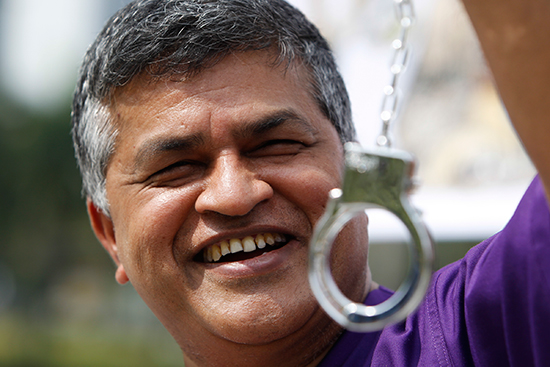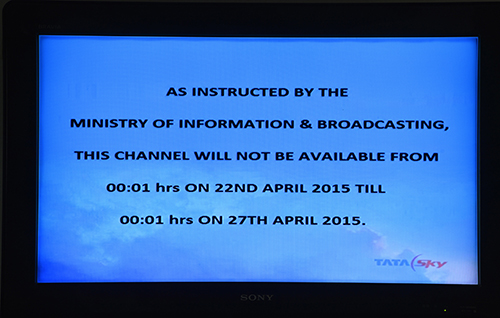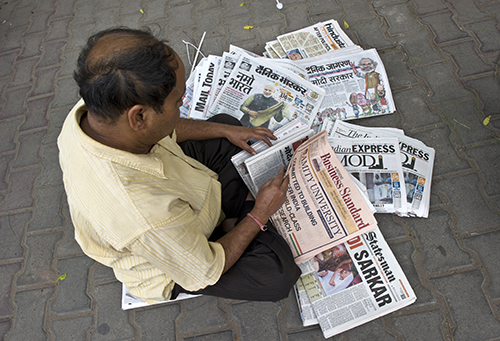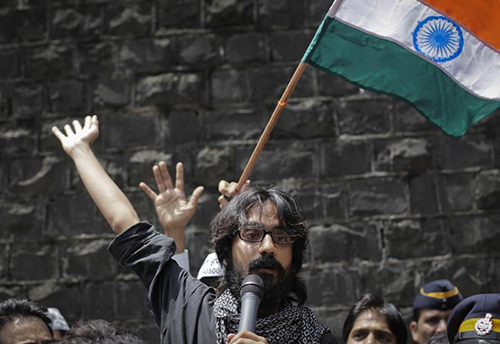Indian journalist beaten and dragged behind motorbike
New York, June 15, 2015–An Indian journalist was beaten by a group of men and dragged behind a motorcycle in Uttar Pradesh state on June 13, in apparent reprisal for his critical reporting, according to reports. The attack comes days after freelance journalist Jagendra Singh was killed in the same state in a case that…
CPJ calls for investigation into journalist’s burning death; police accused
New York, June 10, 2015–The Committee to Protect Journalists calls for an independent investigation into the death of Jagendra Singh, an Indian freelance journalist who died from burn injuries in a hospital in Lucknow on Monday, the Press Trust of India reported. Before he died, Singh alleged that police set him on fire, according to…
India denies public exhibition of film on life of Tamil journalist Shoba
India’s Central Board of Film Certification (CBFC), which regulates the public exhibition of films in the country, declined to certify the film Porkalathil Oru Poo on May 27, 2015, citing the possibility that it could harm “friendly relations with foreign States,” the English-language daily The Hindu reported.

Drawing the line: Cartoonists under threat
On January 7, two gunmen burst into the offices of French satirical magazine Charlie Hebdo, killing eight journalists and bringing into focus the risks cartoonists face. But with the ability of their work to transcend borders and languages, and to simplify complex political situations, the threats faced by cartoonists around the world—who are being imprisoned,…

Indian businesses exert financial muscle to control press
In the late summer of 2014, Indian freelance journalist Keya Acharya found herself embroiled in her own version of the War of the Roses. That August, Acharya was forced to respond to a nine-page legal notice demanding that she pay a staggering 1 billion rupees ($16.3 million) to a company whose owner was upset about…

Five-day ban for Al-Jazeera in India, one year after map error
On Wednesday, Al-Jazeera was forced off the air in India after the government demanded the Qatar-based news broadcaster be suspended for five days for broadcasting images of maps between 2013 and 2014 that did not display Pakistan-controlled Kashmir as separate territory.

Mission Journal: Challenges for India’s press increase as Modi marks first year in office
“Modi has tightened the screws on information.” This statement from Bangalore-based journalist Subir Ghosh underscores a common challenge repeated to me by several of India’s journalists, who say the space for criticism is shrinking under Narendra Modi’s rule. Since a landslide victory made him leader of the world’s largest democracy nearly one year ago, the…

India’s landmark online speech ruling is step toward greater press freedom
In an historic decision, India’s Supreme Court on Tuesday struck down part of a law used to silence criticism and free expression. While this marks a pivotal victory that has been welcomed in many quarters, many challenges remain for press freedom in the country.
CPJ welcomes Indian Supreme Court decision protecting online speech
Manila, March 24, 2015–The Committee to Protect Journalists welcomes the judgment by the Indian Supreme Court today that struck down as unconstitutional Section 66A of the country’s Information Technology Act. Section 66A criminalized, among other types of speech, the transmission of “grossly offensive” information, as well as information for the purpose of causing “annoyance” or…
Bombs thrown at Indian TV station in Chennai
Assailants threw two homemade bombs at the offices of Puthiya Thalaimurai, an independent Tamil television station in Chennai, the capital city of the Indian state of Tamil Nadu, early on March 12, 2015, according to news reports. No one was injured, and the offices did not suffer any damage.